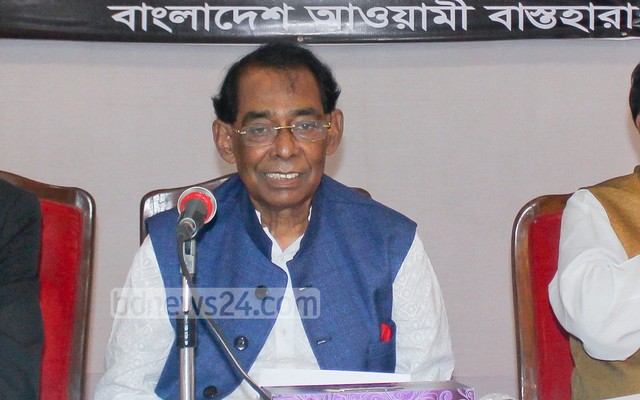Awami League Advisory Council Member Suranjit Sengupta has taken a serious exception to the High Court’s observations on election-time interim government.
Sengupta, the chief of the standing committee on law, justice and parliamentary affairs ministry, told a discussion on Friday the court had ‘no scope’ to make observations on the issue.
He said the High Court made certain observations while pronouncing the verdict declaring the Jan 5, 2014 election legal.
“But the High Court is not a place to write novels,” the senior parliamentarian added.
He said there was no ‘constitutional or democratic crisis’ in the country. “It is clearly mentioned in the Constitution how the elections should be conducted.”
“High Court…Supreme Court…you have said how many members will be there in the (polls-time) government?…But it is not you who can say this,” Sengupta said.
“The prime minister will decide the matter as the executive head,” he added.
The polls-time caretaker government system was buried when the Supreme Court in 2010 repealed the Thirteenth Amendment to the Constitution that had introduced the system.
The Awami League government changed the Constitution in 2011 following the court order. As per that amendment, the ruling party will oversee the general elections.
Sengupta was the co-chairman of the panel formed to change the charter.
The Awami League, as the ruling party, oversaw the next parliamentary election on Jan 5, 2014 in line with the amendment.
The BNP and its allies that protested the change demanding revival of the caretaker government system, boycotted the election.
Awami League and Jatiya Party contenders were elected to 153 seats uncontested.
Two writ petitions were filed challenging the election.
The High Court bench of Justice Mirza Hussain Haider and Muhammad Khurshid Alam Sarkar dismissed the writ petitions on June 19, 2014.
The copy of the full verdict was published this week.
In its verdict, the High Court gave two alternatives to the polls-time government for the next two general elections.
The first alternative allows the serving prime minister to formulate a 50-strong Cabinet with representatives from all parties in Parliament.
That Cabinet can take the charge before 90 days of the general elections.
In the other option, the High Court said the party with majority in Parliament will be in power for four years and the main opposition will rule the last year. The main opposition has to secure at least half the number of votes the ruling party gets.
The court also observed the Constitution needed to be changed to accept any of the alternatives.
About the observations, former minister Sengupta said the High Court ‘did one thing while doing something else’.
“We honour the Supreme Court and the High Court, but there is no scope to make such observations,” he asserted.
“I have to say with regret that the observations were irrelevant. Our expectations from you (top courts) are much higher,” he added.
Sengupta also said there was no scope to conspire over the general elections under the supervision of the ruling party.
“The government will do its job… The prime minister of an elected government will hand over the power to the prime minister of another (next) elected government,” he said.
Senior legislator Sengupta’s remarks follow Thursday’s Supreme Court verdict against two editors of a daily for contempt after they published a sub-judice matter.
Sengupta, however, did not say anything on this verdict.
Source: Bd news24

